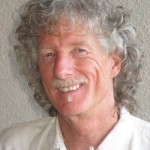
“It is the motivating thought, the spiritual content, that validates the mortal supplication. Words are valueless” [Paper 7:3, p. 85.1].
Nevertheless, I would share some words with you about thoughts.
To ponder the creation of thought is an intriguing mental exercise, but one leans into the realm of religious mystery when reflecting on the fact that thoughts can create. “The Original and Eternal Son is the offspring-person of the “first” completed and infinite thought of the Universal Father” [7:6].
In everyday life, we often treat thought like sports paraphernalia in the playing field of our mind. We toss them around in our consciousness, generally oblivious to their awesome and divine power. Sometimes they bounce into other thoughts and gather themselves up into ideas. But what is a thought? Physically speaking we know it involves nerve cells, dendrites, axons, neurons, and chemical neurotransmitters. Such neural systems are directed networks, receiving and broadcasting signals that form systems and then bundles of systems. These clusters have been identified as sensory relay stations, integrative centers, memory modules, and emotional control centers.
Santiago Ramon y Cajal, a Spanish histologist, won the 1906 Nobel Prize for his research and commented: “Like the entomologist in pursuit of brightly colored butterflies, my attention hunted, in the flower garden of the gray matter, cells with delicate and elegant forms, the mysterious butterflies of the soul, the beatings of whose wings may some day—who knows?—clarify the secret of mental life.”
“Man’s mind can be truly comprehended only by recognizing the reality of higher orders of thought and purposive will” [53:01]. Do we give recognition to the reality of this higher order of thought? Can we acknowledge that this duo of thought and will manifests as creation? As in, that stuff can really happen! In the moment after Jesus “unintentionally” turned the water into wine, we are informed, “But Jesus said nothing. He now realized that he had already said—or rather desirefully thought—too much” [137:4].
James Allen, in his classic tome, As A Man Thinketh, nicely states this miraculous truth: “Thought allied fearlessly to purpose becomes creative force: he who knows this is ready to become something higher and stronger than a mere bundle of wavering thoughts and fluctuating sensations; he who does this has become the conscious and intelligent wielder of his mental powers.” He offers a poignant reminder of this reality: “All that a man achieves and all that he fails to achieve is the direct result of his own thoughts.”
It’s of interest that faith is defined as “the supreme assertion of human thought” [3:5]. “The creator thought invariably precedes creative action” [2:7]. Our revelational reference book describes the Trinity as Thought, Word, and Action—a nod to the ranking of thought in terms of cosmic reality. We are further informed about this divine pattern:
“Mortal consciousness proceeds from the fact, to the meaning, to the value. Creator consciousness proceeds from the thought-value, through the word-meaning, to the fact of action.” [Paper 118.5, p. 1299.3]
The loving consignment of a Thought Adjuster is from the Father and of our Creator. He adjusts the creation of our thoughts if we sincerely request, but cannot adjust them after they have been created. That would violate our free will and bend our reality. Instead, we must pray, listen, and ask to have new and increasingly spiritual thoughts. God’s will can be found in the gift of his thoughts.
If it is true, as the sages have said, that the body is a temple and our eyes a window to the soul, then our thoughts may be the choir of God himself, an opus of spiritual accord conducted by our pre-personal Accompanist who begs our harmony. Sound too metaphoric? “Melody of thought—the thinking of spiritual thoughts can be so perfected as to burst forth in the melodies of Havona” [499:10].
Let the performance begin.
